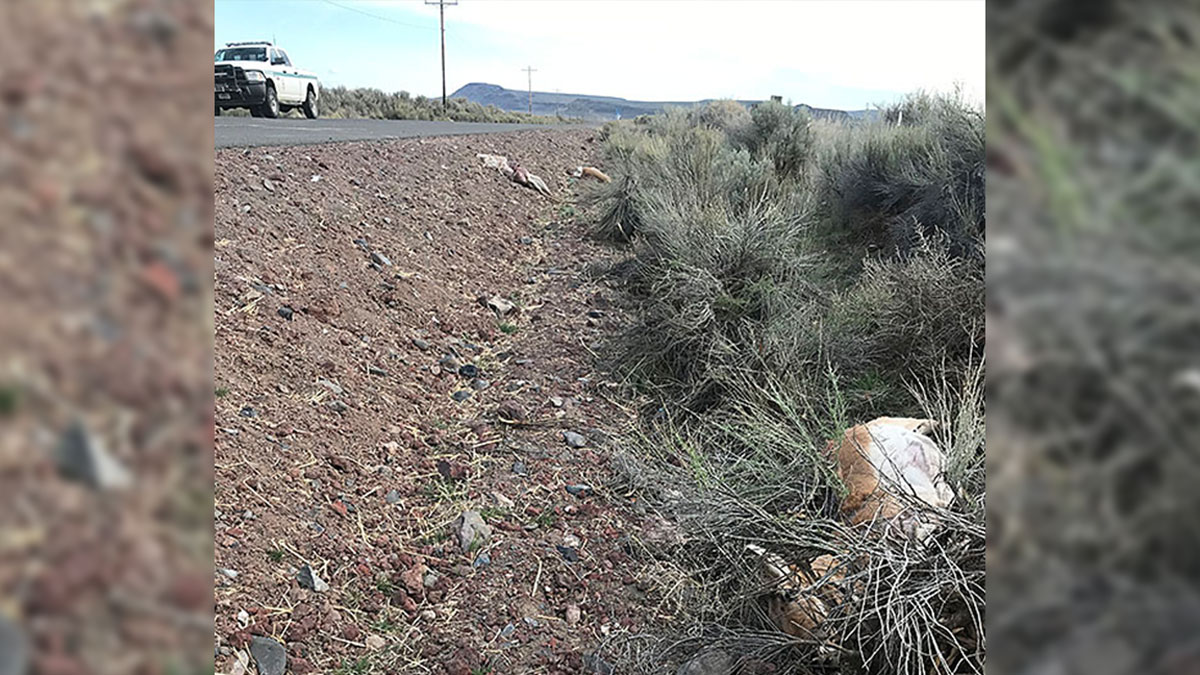Below is a news release from the Oregon Department of Fish and Wildlife.
Six pronghorn antelope were run down with a pickup truck on a roadway in south-central Oregon’s Lake County on April 26 are the latest in a string of poaching thrill kills in Oregon. The driver, Michael Scott Phillips, 48, of Christmas Valley, told authorities that he did it because he hates pronghorn.
Oregon State Police Fish and Wildlife Division (OSPFWD) Troopers discovered a grisly scene of five does and one buck pronghorn antelope, their carcasses strewn along Fossil Lake Road near Christmas Valley. The buck’s horns had been removed and taken as a trophy. One doe was eviscerated with a knife—her unborn fawn removed and placed on its mother’s carcass. May is fawning season for antelope in Oregon. Any pregnant does would have given birth within a month had they not been killed.
OSPFWD received the initial report of the crime through the Turn In Poachers (TIP) Line. The caller reported hearing a man bragging about accelerating his pickup to hit several pronghorns, which were bunched together in the middle of the road. The man said he left the scene to get a hamburger, then returned later to retrieve the buck’s horns.
Troopers served a search warrant on Phillips’ residence in late May. They recovered the horns and other evidence linking Phillips to the crime, according to OSPFWD Sgt. Lowell Lea. Phillips admitted that he accelerated to more than 60 mph to hit the antelope, and confirmed they were bunched together in the road. There was no evidence that he slowed down or tried to stop before striking the animals.
Phillips said he did it because he hates pronghorns, according to Sgt. Lea. Phillips was arrested on May 21. He is lodged in the Lake County Jail facing multiple charges including aggravated animal abuse, take/possession of antelope, and waste of a game mammal.
“Not all poaching involves the use of a firearm,” Sgt. Lea said, “This is not the first case of people poaching with a vehicle. And poaching takes opportunities away from hunters and others.”
This incident comes after three Oregon men were cited in May for allegedly poaching 27 big game animals in multiple counties over the past two years. A concerned citizen contacted the TIP Line to report the poaching ring. Restitution for the crimes, which occurred in Benton, Lane, Linn, Lincoln, Polk and Tillamook Counties, may top $162,000.
In April, two men were charged with poaching a pronghorn buck, a branch bull elk and six buck deer over the past year in Grant County.
In July, OSPFWD identified a poaching hot spot in Columbia County, where two elk and a buck deer were shot over a period of three months near Weyerhaeuser property. All three animals were left to waste where they were shot, with little or no meat taken.
The Oregon Hunters Association operates the TIP Line. Callers receive a cash reward or hunting preference points if their report leads to a citation or arrest. The TIP Line rewards program is funded primarily through hunter restitution fees and fines. The reward for reporting a poached deer, elk or antelope is four preference points or $500. Last year OHA awarded more than $21,000 in rewards, and ODFW awarded 143 hunter preference points to people who reported to the TIP Line.
ODFW anti-poaching campaign coordinator Yvonne Shaw, says the crimes reflect wanton disregard for wildlife, wildlife laws and fellow Oregonians.
“When people poach, they steal from all of us,” Shaw said. “Coming across a herd of pronghorns is a once-in-a-lifetime experience that most Americans would hold as a treasured memory. Instead, a poacher has robbed the animals of their lives and everyone else of the experience.”
The Stop Poaching Campaign educates the public on how to recognize and report poaching. This campaign is a collaboration among hunters, conservationists, land owners and recreationists. Our goal is to increase reporting of wildlife crimes through the TIP Line, increase detection by increasing the number of OSP Fish and Wildlife Troopers and increase prosecution. This campaign helps to protect and enhance Oregon’s fish and wildlife and their habitat for the enjoyment of present and future generations. Contact campaign coordinator Yvonne Shaw for more information. Yvonne.l.Shaw@state.or.us.
The Rocky Mountain Elk Foundation is increasing the visibility of poaching incidents in an effort to reduce poaching nationwide.
(Photo source: Oregon State Police Fish and Wildlife Division)
